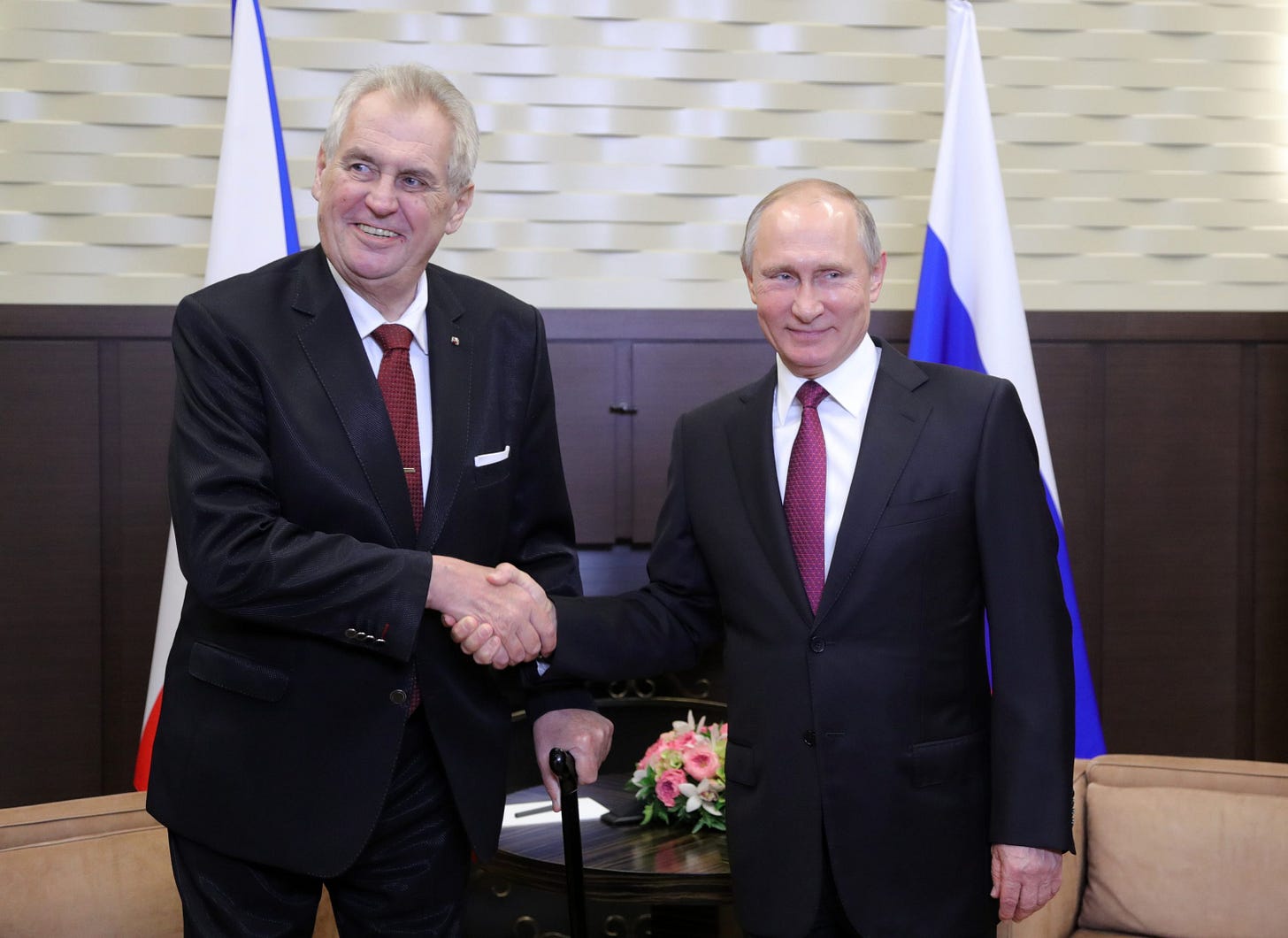Russia Accused of 2014 Terror Attack in the Czech Republic
For President Biden, it should be a wake-up call to strengthen pro-Western forces in Central and Eastern Europe.

Just days after President Joe Biden’s imposition of new financial sanctions and diplomatic expulsions on Russia—which Russia quickly responded to, tit for tat—came a new development confirming that relations between the West and Russia have reached a very low point. Czech Prime Minister Andrej Babiš announced on Saturday that there was credible evidence that a special unit of the GRU, the Russian military intelligence service, was behind a huge explosion in 2014 in a weapons and ammunition depot in the southeastern part of the Czech Republic that killed two people.
Immediately following this weekend’s announcement, the Czech government expelled eighteen Russian diplomats that its counterintelligence identified as working under a diplomatic cover for the GRU and its sister organization, SVR, Russian intelligence. Russia denied the accusation, and just as it quickly retaliated against the U.S. sanctions and expulsions, so did it immediately retaliate against the Czech expulsions, kicking twenty Czechs out of the embassy in Moscow. The situation will likely escalate. While Czech Republic will only have five diplomats remaining in Moscow, which will effectively paralyze its Russian diplomacy, the giant Russian embassy in Prague numbered between 130 and 140 diplomats before the crisis. According to Czech intelligence insiders, the Russian embassy in Prague serves as a base for nefarious activities not just against its host country, but regionally, especially against Germany. Under normal—that is, non-pandemic—conditions, it is extremely easy to travel throughout Central and Western Europe, where there are no border controls. Further diplomatic repercussions might follow this week after the EU foreign ministers’ meeting on Monday.
The two agents of the GRU’s Unit 29155 allegedly involved in the Czech sabotage are well known to Western audiences. They are Alexander Mishkin and Anatoliy Chepiga, the same men wanted by the United Kingdom for the poisoning of the double agent Sergei Skripal and his daughter Yulia in March 2018 in Salisbury (as well as two other apparent collateral victims). It turns out that three and a half years before the poisoning of the Skripals, Mishkin and Chepiga had used the same fake passports and same aliases in the Czech Republic. According to sources from within the Czech investigation, the case also might be related to another Russian attack in Bulgaria in 2015, where Emilian Gebrev, a major arms trader who was supplying weapons to Ukraine, was poisoned in a restaurant in Sofia. Gebrev survived the attack.
Czech authorities have apparently been working with the investigative hypothesis that the 2014 weapons and ammo explosion was an accident—that an arms shipment, to none other than Gebrev, was intended to go off during transport, but instead exploded prematurely.
The allegation that six years ago Russia sponsored a terrorist attack on the territory of the Czech Republic, a NATO member state, is the largest crisis between the two countries since the Soviet invasion of Czechoslovakia in August 1968. It could have serious implication for Czech allies in NATO and the EU. One important message for the West, and especially the Biden administration, is that although the Russian influence game within Czech politics is serious and increasing, with regards to democracy and government institutions the Czechs are still doing significantly better than their Polish and Hungarian brethren, who have slid dangerously far on the road to authoritarianism.
Still, there is no need to idealize the Czech Republic. Prime Minister Babiš is a Trump-like bumbler and billionaire oligarch with many monstrous conflicts of interest: He is a gobbler of European subsidies whose dispersal he himself oversees, not to mention the owner of powerful newspapers that he manipulates for his political and business ends. Meanwhile, the twice-elected Czech president, Miloš Zeman, is a Russian puppet. His presidential campaigns are reported to have been financed with Russian money, and he is doing his best to push the Kremlin line in the EU. Just recently, he scored an important political victory when he reportedly forced Babiš to rid his cabinet of two ministers who opposed the purchase of the Russian coronavirus vaccine, Sputnik V, that has not yet been approved by the European Medicines Agency as safe.
Zeman has also been lobbying heavily for the Russian state energy corporation, Rosatom, to bid on a project (worth $7.2 billion) to expand and modernize the nuclear power station in Dukovany. The Czech Ministry of Foreign Affairs and the intelligence community vigorously oppose the invitation for the Russians on the grounds of national security. Just before the terrorist attack revelation, the Czech minister of trade, a Zeman ally, was pushing hard behind the scenes against the national security community and for the Russians. Now, even Prime Minister Babiš acknowledges that Rosatom will almost certainly not be invited to bid for the project.
Despite serious corruption of a part of Czech politics by Russian and Chinese political money, and the major problems of Babiš and Zeman, there are still healthy institutions in the country not afraid to stand up for democracy, the truth, and a pro-Western orientation. The revelation that Russia was apparently behind the 2014 terrorist attack will strengthen these forces, from the country’s constitutional court, to the cabinet that despite its issues has been fairly pro-EU and pro-United States, to the liberal-democratic opposition poised to win in the fall parliamentary elections and isolate the agents of Moscow and Beijing, including Zeman.
For the Biden administration, this incident should be a wake-up call to take Central and Eastern Europe seriously and help it more effectively cope with the Russian subversion, disinformation, and hybrid war. As Putin moves his army closer to the Ukrainian border, it would be naïve to expect that he will abandon his dark operations in a region he has never ceased to consider a legitimate sphere of Russian influence.

